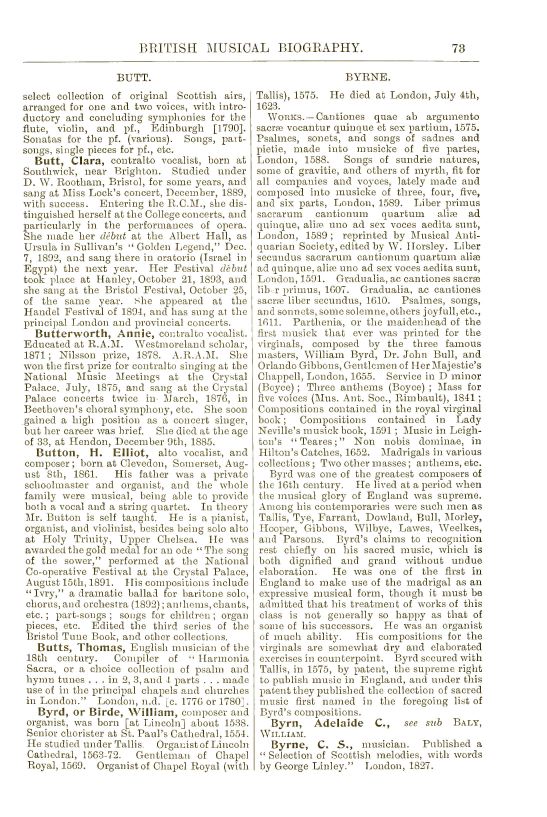- Byrd, or Birde, William
[E] Byrd, or Birde, William, composer and
organist, was born [at Lincoln] about 1538.
Senior chorister at St. Paul's Cathedral, 1554.
He studied under Tallis. Organist of Lincoln
Cathedral, 156.3-72. Gentleman of Chapel
Royal, 1569. Organist of Chapel Royal (with
Talhs), 1575. He died at London, July 4th,
1623.[W] Works.— Cantiones quae ab argumento
sacrte vocantur quinque et sex partium, 1575.
Psalmes, sonets, and songs of sadnes and
pietie, made into musicke of five partes,
London, 1588. Songs of sundrie natures,
some of gravitie, and others of myrth, fit for
all companies and voyces, lately made and
composed into inusicke of three, foiir, five,
and six parts, London, 1589. Liber primus
sacrarum cantionum quartum alife ad
quinque, ali?e uno ad sex voces aedita sunt,
London, 1589 ; reprinted by Musical Anti-
quarian Society, edited by W. Horsley. Liber
secundus sacrarum cantionum quartunr aliae
ad quinque, alite uno ad sex voces aedita sunt,
London, 1591. Gradualia, ac cantiones sacrse
libirr primus, 1607. Gradualia, ac cantiones
sa.crae liber secundus, 1610. Psalmes, songs,
and sonnets, some solemne, others joyfull,etc.,
1611. Parthenia, or the maidenbead of the
first musick that ever was printed for the
virginals, composed by the three famous
masters, William Byrd, Dr. John Bull, and
Orlando Gibbons, Gentlemen of HerMajestie's
Chappell, London, 1655. Service in D minor
(Boyce) ; Three anthems (Boyce) ; Mass for
five voices (Mus. Ant. Soc, Rimbault), 1841 ;
Compositions contained in the royal virginal
book ; Compositions contained in Lady
Neville's musick book, 1591 ; Music in Leigh-
ton's "Teares;" Non nobis dominae, in
Hilton's Catches, 1652. Madrigals in various
collections; Two other masses; anthems, etc.
Byrd was one of the greatest composers of
the 16th century. He lived at a period when
the musical glory of England was supreme.
Among his contemporaries were such men as
Tallis, Tye, Farrant, Dowland, Bull, INIorley,
Hooper, Gibbons, Wilbye, Lawes, Weelkes,
and Parsons. Byrd's claims to recognition
rest chiefly on his sacred music, which is
both dignified and grand without undue
elaboration. He was one of the first in
England to make use of the madrigal as an
expressive musical form, though it must be
admitted that his treatment of works of this
class is not generally so happy as that of
some of his successors. He was an organist
of much ability. His compositions for the
virginals are somewhat dry and elaborated
exercises in counterpoint. Byrd secured with
Tallis, in 1575, by patent, the supreme right
to publish music in England, and under this
patent they published the collection of sacred
music first named in the foregoing list of
Byrd's compositions.entry id: 73-L-58

page 73 - view at internet archive
Related Links
Concert Programmes Project
475 - Byrd, William
Calendar of London Concerts 1750-1800
BYRD - Byrd, William
